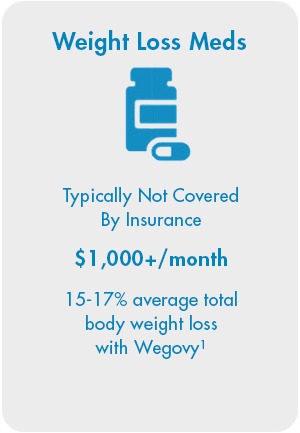With so many weight loss options available and all the new weight loss medications on the market, it’s hard to know “what’s the right choice for me?” It’s important to know the facts, the cost, and manage your expectations based on your individual situation and your personal weight loss goals.
Dr. Nick Nicholson, Medical Director, Bariatric Surgeon with the Nicholson Clinic, discusses weight-loss options and explains why weight loss surgery is still the safest, most effective solution for significant, lasting, weight loss.
Is Bariatric Surgery Right for Me?
Doctors look at Body Mass Index (BMI) and other obesity-related diseases (comorbidities) as an important criteria to determine whether weight loss surgery is a suitable option or not. Generally speaking, bariatric surgery is considered appropriate for people with a BMI greater than 40 or with a BMI greater than 35 and one or more obesity-related comorbidity. In certain circumstances, patients with a lower BMI, 30-34.9, may also be suitable candidates.
Weight loss surgery can kick-start your path to a healthier, longer, and more fulfilling life. Patients can in many cases experience the benefits immediately after surgery. Examples of common benefits from bariatric surgery are:





Weight Loss Surgery vs. Weight Loss Medication


According to recent FDA updates as of October 3, 2024, compounded weight loss drugs, specifically those containing tirzepatide (like Mounjaro and Zepbound), will no longer permitted to be dispensed as the shortage of these medications has officially ended, meaning pharmacies must stop preparing compounded versions of these drugs. Thus, people who were receiving compounded versions at $300-$500/month will no longer have access at that price point, and will need to pay over $1,000/month, for life, if they want to stay on it and maintain their weight loss.
Weight loss surgery is the most proven, effective, long-term solution for weight loss.
While certain weight loss medications and diet programs can be effective for some, they tend to be more viable options for patients with a lower Body Mass Index (BMI) and without underlying health conditions. In addition, studies show weight loss programs, pills and injections often result in only temporary weight loss and once the medication is stopped or the program is complete, people tend to regain the weight. And this can be quite costly to sustain. In fact, we are also seeing an increasing number of insurance providers changing their policies to cover more bariatric surgery options due to the high cost of weight loss medications and temporary results.
For many, the only way to truly lose weight and keep it off is to recalibrate your system with minimally invasive weight loss surgery. Our patients are losing weight, keeping it off and enjoying life again! Get started today!
Recent Press On Weight Loss Medications
Bariatric Surgery Is More Cost Effective Than Newer Weight Loss Drugs Alone
American College of Surgeons, October 18, 2024
The end of a shortage of popular weight-loss drugs may mean many people lose access to them
CNN, October 9, 2024
Popular Weight-Loss Drugs Prove More Costly Than Metabolic and Bariatric Surgery Within One Year
ASMBS, October 7, 2024
Bariatric surgery better for weight loss than GLP-1 drugs such as Ozempic
Medical News Today, June 11, 2024
Possible Ozempic side effects including hair loss and suicidal thoughts probed by FDA
Nicholson Clinic, January 3, 2024
GLP-1s Face Off Against Each Other, Weight-Loss Surgery in New GI Studies
Nicholson Clinic, December 19, 2023
Users of Weight Loss Drugs Regain Weight After Stopping Use
Nicholson Clinic, December 19, 2023
People lost nearly 50 pounds on Zepbound — but gained more than half back when they stopped taking it
Nicholson Clinic, December 11, 2023
Bariatric Surgery Still Best Option for Some With Obesity
Nicholson Clinic, November 30, 2023
Employers cut off access to weight loss drugs for workers
Wall Street Journal, August 2, 2023
Lawsuit claims Ozempic, Mounjaro labels ‘downplayed severity’ of gastroparesis
Healio Gastroenterology, August 4, 2023
Patients grapple with side effects of popular weight-loss drugs.
Washington Post, August 8, 2023
Weight Loss Surgery Should Not Be Your Last Resort to Lose Weight
Nicholson Clinic, August 9, 2023
Popular Medications for Diabetes and Weight Loss May Cause Problems with Elective Surgeries or Severe Gastroparesis
Nicholson Clinic, August 9, 2023
Weight loss drugs can lead to muscle loss, too.
Nicholson Clinic, May 20, 2023
Why experts worry the ‘magic’ in new weight loss medications carries a dark side
USA Today, April 4, 2023
Despite All the Hype Around Weight Loss Medications, Weight Loss Surgery Is Still the Most Proven and Effective Solution for Obesity
Nicholson Clinic, January 19, 2023
- Christou NV, Sampalis JS, Liberman M, et al. Surgery decreases longterm mortality, morbidity, and health care use in morbidly obsepatients. Ann Surg 2004; 240:416–423; discussion 423–424.
- Schauer PR, Ikramuddin S, Gourash W, Ramanathan R, Luketich J. Outcomes after laparoscopic Roux-en-Y gastric bypass for morbid obesity. Ann Surg 2000; 232:515–529.
- DeMaria EJ, Sugerman HJ, Kellum JM, Meador JG, Wolfe LG. Results of 281consecutive total laparoscopic Roux-en-Y gastric bypassesto treat morbid obesity. Ann Surg 2002; 235:640–645; discussion 645–647
- https://eu.usatoday.com/story/news/health/2023/02/19/anti-obesity-medications-cost/11069886002/
- Villela R, Correa R. 2019. Semaglutide 2.4 Mg (2022): The Latest GLP-1RA Approved for Obesity. Journal of Investigative Medicine
- Rijswijk AS, et al, 2021. What Is Weight Loss After Bariatric Surgery Expressed in Percentage Total Weight Loss (%TWL)? A Systematic Review












